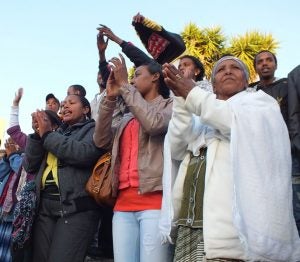Libyan human traffickers prey on traveling refugees
April 1, 2016
Majority of refugee women traumatised by violence
March 28, 2016
The Latest: Syrian woman gives birth at Greek refugee camp
March 26, 2016
Number of female migrant workers increasing gradually
March 22, 2016
March 11, 2016
Human rights of refugee and migrant women and girls need to be better protected [EN/RU]
March 9, 2016
Richard Beddock: Female migrants in an ‘impossibly vulnerable situation’
March 8, 2016
Western Sahara: Women Held in Refugee Camps
March 4, 2016
‘Lady SOS’: The woman saving Syrian refugees at sea
February 24, 2016
#womensvoices: female refugees need more rights
February 10, 2016
Migrant women face £6,000 birth bill under ‘health tourism’ laws
February 4, 2016
Female Syrian Refugees in Lebanon Face Heightened Risks of Sexual Assault
February 2, 2016
Harsh Policing of Immigration is Bad for Everyone
January 26, 2016
Report warns refugee women on the move in Europe are at risk of sexual and gender-based violence
January 20, 2016
Violence against refugee women is often ignored
January 13, 2016
On Perilous Migrant Trail, Women Often Become Prey to Sexual Abuse
January 2, 2016
October 15, 2015
Cost of Illegal Immigration in North Carolina
October 14, 2015
NC driving privileges for people in US illegally clears committee
June 9, 2015
Debate over immigrants getting North Carolina driver’s licenses continues
June 9, 2015
Why We Fast Today in North Carolina
March 17, 2015

NC Women United leader decries anti-immigrant legislation
October 20, 2015
President of NC Women United, Tara Romano, spoke at a rally to criticize the new HOUSE BILL 318. She claims that this bill “wrongfully target[s] immigrants and food assistance recipients.” This current legislation proposal is awaiting further review and decision by Governor McCrory. For more information about the House Bill 318. Follow the link for Romano’s full statement on this legislation.
Illegal immigrants boycott threatened in North Carolina
August 19, 2014
Mothers whose ties are cut at the border
March 19, 2014

January 31, 2014

06/18/2013
By Katherine Ayers
The Daily Reflector
Saturday, June 15, 2013
The face of Latino immigration into North Carolina is changing with more Latina women entering the state at a higher rate than ever before. Census data released on Thursday showed Latinas make up 46.8 percent of the total Latino population in the state as of July 2012, up from 40.1 percent in 2000. In total, Latinos make up 8.7 percent of the total state population. In Pitt County, they are 5.5 percent of the population, up from 3.2 percent 10 years ago.
According to Carolina Ramirez-Suárez, an employee with the Association of Mexicans in North Carolina (AMEXCAN), the increase in Latinas is a natural extension of the Latino male immigration that happened previously “Maybe because they wanted to follow their brothers or husbands but nowadays what is happening is that the woman is migrating alone,” she said. Ramirez-Suárez, who has worked with AMEXCAN’s office in Mexico since 2001 and is visiting the local office until June 26, said that when the men left the towns and villages, the women still had to take care of their homes and families.
“They found out they were able to manage all things alone with no men,” she said. “I think this is one of the points that makes the (women) start migrating by themselves. ”While Suárez said the power the women gain over their own lives is a positive, immigration also can put a strain on the families they leave behind. “Some of them have little children they left with (the children’s) grandmother who has no tools to take care of these new responsibilities,” she said. Many times the grandmothers are uneducated, out of work and do not have the means to take care of the new children they have been given.
Ramirez-Suárez said another push for a woman to migrate and follow her husbands is that other men in the village may try to take advantage of the fact that she’s now alone. “It’s fighting with the old ideas of patriarchy, macho culture,” she said. “She (becomes) kind of like an object for the men” even though she’s married. Once women get to America, either as documented or undocumented immigrants to look for work in the service sector in factories, restaurants and hotels, the strength they learned in their home country becomes even more important, Ramirez-Suárez said.
“The women for the first time have to do things they’re not used to like driving,” she said. “Back home there was no need to drive, the villages are all too little, so they can walk or if they want to get to the city they can take a bus.” They must also learn to work without the support network of grandmothers, aunts and sisters they had in their home countries. The issues with family dynamics do not end when a woman leaves Mexico, Ramirez-Suárez said. Many times a Mexican man in America is still searching for the “traditional” woman willing to stay home, cook and iron.
The difference now is that women understand that staying home is a choice, rather than something they must do. “Women are aware they’re working, they’re earning money, so why can’t they share the other (domestic) work with the man,” Ramirez-Suárez said. “This is the opportunity to get this consciousness, I’m excited to hear this from them.” That consciousness is not transferring to the daughters of the Latina immigrants, many of whom were born in America. The rate of teen pregnancy in the Latino community is high, according to Suárez.
Even if the wife knows a different life, the daughters still have their fathers, grandmothers and other extended family trying to pull them back into the traditional way of living. “The family says ‘no, she has to stay at home, she has to not go out,’ even though she’s (working) and earning money,” Ramirez-Suárez said. Education for both teenage boys and girls is the most important piece of the puzzle, she said. “We have to give them tools and give them guidance,” Ramirez- Suárez said.
Ramirez-Suárez predicted the rate of Latina immigration is going to accelerate in the coming years, especially for those with advanced education degrees. “We have to fix a lot of things in Mexico,” she said, referring to the increase in violence. “My town used to be extremely calm, my children used to walk to school and come back with no problem at all. Now they’re kidnapping kids and women and killing journalists. It’s shocking.” Ramirez-Suárez said the goal of AMEXCAN is to give people options.“ What (AMEXCAN) is trying to do in Mexico is to make people conscious to know that it’s a right to migrate, but it’s a decision,” Ramirez-Suárez said. “They have a right to say no, too, and find other ways to stop this massive migration” to America.
Contact Katherine Ayers at kayers@reflector.com and 252-329-9567
Juvencio Rocha Peralta
Executive Director
Association of Mexicans in North Carolina, Inc (AMEXCAN)
P.O. Box 2744
Greenville, NC 27836-0744
Office: 252.757.3916
Cell: 252.258.9967
juvenciorp@amexcannc.org
NORTH CAROLINA COMMUNITY ACTIVIST TO BE DEPORTED
May 1, 2013

NORTH CAROLINA SAYS: REFORM IMMIGRATION NOW
April 23, 2013
Unequal Pay Day for Immigrant Women
April 9, 2013

ON INTERNATIONAL WOMEN’S DAY, A REMINDER THAT IMMIGRATION IS A WOMEN’S ISSUE
March 8, 2013

September 22, 2012